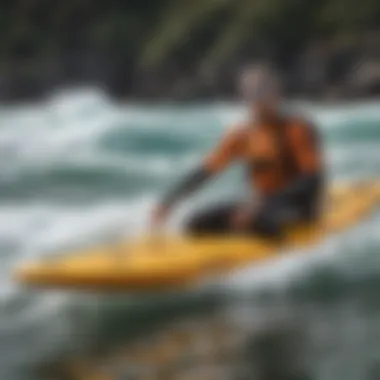Unlocking the Vital Role of Surf Rescue Boards in Water Sports Safety
Water Activities Overview
When delving into the world of water sports, enthusiasts encounter a plethora of thrilling activities that cater to all levels of experience. From the adrenaline-fueled rush of surfing to the serene beauty of snorkeling, each water activity offers a unique perspective on the vast expanse of the ocean. Sailing presents a blend of adventure and skill, while paddleboarding provides a calming yet invigorating way to explore coastal waters.
Surfing
Surfing, a sport synonymous with sun, sea, and sand, captures the essence of water sports with its dynamic blend of athleticism and artistry. Riding the waves atop a surfboard requires not just physical prowess but also a deep connection with the ocean's rhythmic currents and swells.
Sailing
For those seeking a more leisurely yet rewarding experience, sailing offers a sophisticated blend of technical proficiency and seafaring elegance. Whether cruising along the coastline or embarking on a voyage across open waters, sailing appeals to those with a penchant for both adventure and tranquility.
Snorkeling
Beneath the surface lies a world of wonder waiting to be explored through the practice of snorkeling. With its simplicity and accessibility, snorkeling allows enthusiasts to witness marine life up close, providing an unparalleled glimpse into the mesmerizing ecosystem beneath the waves.
Paddleboarding
Paddleboarding combines the tranquility of traditional surfing with the ease of maneuvering a paddle, offering enthusiasts a harmonious balance of relaxation and exercise. Ideal for exploring calm waters and hidden coves, paddleboarding provides a unique perspective on coastal landscapes.
Tips and Techniques
Navigating the realm of water sports can be both exhilarating and daunting, especially for beginners looking to hone their skills and experienced enthusiasts seeking to push their boundaries. Here are some essential tips, advanced techniques, and safety guidelines to enhance your water sports experience:
Tips for Beginners
- Start by mastering the basics, such as paddling techniques and water safety practices, before moving on to more challenging maneuvers.
- Take lessons from certified instructors to build a strong foundation and avoid developing bad habits.
- Invest in quality gear and equipment that suits your skill level and enhances your performance on the water.
Advanced Techniques for Experienced Enthusiasts
- Experiment with advanced maneuvers like carving, bottom turns, and cutbacks to elevate your surfing or paddleboarding skills.
- Fine-tune your sailing techniques by practicing navigation, sail trimming, and maneuvering in varying wind conditions.
- Explore deeper waters and hone your snorkeling techniques by mastering breath-holding and diving to observe marine life up close.
Safety Guidelines
- Always wear a personal flotation device (PFD) and carry essential safety gear, such as whistles, signaling devices, and first aid kits.
- Stay informed about weather conditions, tides, and currents to ensure a safe and enjoyable water sports session.
- Buddy up with a fellow enthusiast or inform someone on land about your intended route and estimated return time for added safety.
Gear Reviews
Central to the water sports experience is having the right gear that enhances performance, comfort, and safety in the aquatic environment. Explore our reviews of top-notch surfboards, sailboats, snorkeling equipment, paddleboards, and wetsuits to elevate your water sports adventures:
Surfboards
- From shortboards designed for maneuverability to longboards built for stability, surfboards come in a variety of shapes and sizes to cater to different riding styles and skill levels.
- Look out for features like rocker, tail shape, and fin setups that influence a board's performance in varying wave conditions.


Sailboats
- Sailboats range from compact dinghies ideal for solo expeditions to spacious yachts perfect for group outings, offering diverse options for sailors of all preferences.
- Consider factors like rigging, hull design, and keel type when selecting a sailboat that aligns with your sailing goals and skill level.
Snorkeling Equipment
- Snorkeling equipment comprises essential gear such as masks, snorkels, fins, and wetsuits that optimize comfort and functionality while exploring underwater environments.
- Choose high-quality snorkeling gear that provides a snug fit, optimal visibility, and ease of breathing for immersive aquatic experiences.
Paddleboards
- Paddleboards come in various shapes and sizes, catering to different water conditions and paddling styles. From inflatable boards for portability to rigid boards for stability, selecting the right paddleboard enhances your on-water performance.
- Consider factors like volume, width, and hull design when choosing a paddleboard that matches your skill level and intended water activities.
Wetsuits
- Wetsuits serve as vital protection against cold water temperatures and offer buoyancy for extended water sports sessions. Select a wetsuit that fits snugly, provides ample mobility, and offers insulation without compromising comfort.
- Pay attention to details like thickness, material, and seam construction to ensure optimal warmth and flexibility during water sports expeditions.
Destination Guides
Embark on a journey of water sports exploration with our curated destination guides to popular coastal locales, hidden gems brimming with aquatic wonders, and essential travel tips for seamless water sports trips. Discover the beauty of diverse water environments and unlock new horizons for your aquatic adventures.
Popular Water Sports Locations
- Explore renowned destinations like Hawaii, Australia, and California known for their world-class surfing, sailing, and snorkeling opportunities.
- Immerse yourself in the vibrant water sports culture of each location, from surfing meccas like Pipeline to tranquil snorkeling spots like the Great Barrier Reef.
Hidden Gems for Water Enthusiasts
- Uncover hidden gems off the beaten path, from secluded coves with pristine paddleboarding conditions to remote snorkeling sites teeming with marine biodiversity.
- Experience the allure of undiscovered water sports paradises and forge unforgettable memories in secluded oases of natural beauty.
Travel Tips for Water Sports Trips
- Plan your water sports itinerary meticulously, considering factors like seasonality, equipment rentals, and local regulations for a seamless and enjoyable trip.
- Pack essentials such as sunscreen, water bottles, and snacks to stay energized and protected during your water sports excursions.
From mastering the art of riding the waves to exploring vibrant underwater seascapes, the world of water sports beckons with thrilling adventures and enriching experiences. Dive into this comprehensive guide to gain a deeper understanding of the significance of surf rescue boards and elevate your water sports pursuits with confidence and knowledge.
Introduction
Surf rescue boards are an integral component of water safety measures, especially for individuals participating in watersports. These specialized boards serve a vital role in ensuring rapid response and effective rescue operations in water-related emergencies. Understanding the significance of surf rescue boards is paramount for enthusiasts engaging in activities where water poses a risk. This section will delve into the pivotal importance and unique advantages that surf rescue boards offer in terms of enhancing safety and security for both swimmers and rescue teams.
Overview of Surf Rescue Board
Surf rescue boards, commonly referred to as rescue surfboards, are specifically designed to aid in water rescue operations. These boards are crafted with precision to withstand varying water conditions and support swift navigation in emergencies. Providing buoyancy and stability, surf rescue boards are essential tools for lifeguards and water sports professionals to extend aid and ensure the safety of individuals in distress.
Surf rescue boards feature a streamlined design that facilitates quick movement through water, enabling rescuers to reach individuals in need efficiently. Equipped with features such as handles and grip pads for secure handling, these boards are optimized for rescue missions. Boasting exceptional durability and buoyancy, surf rescue boards are meticulously crafted to withstand the rigors of emergency situations, making them reliable assets in critical moments.
The evolution of surf rescue boards has revolutionized water rescue practices, allowing for greater efficacy and precision in responding to emergencies. Innovations over the years have enhanced the maneuverability and floatation capabilities of these boards, making them indispensable tools for water safety professionals and enthusiasts alike.


In the subsequent sections of this guide, we will explore the history, design, functionality, maintenance, safety protocols, and training aspects related to surf rescue boards, offering a comprehensive insight into their crucial role in ensuring water safety and facilitating rescue operations.
History and Evolution
Surf rescue boards have a rich history and an intriguing evolution that have significantly impacted water safety practices. Delving into the historical background of surf rescue boards allows us to appreciate the advancements and innovations that have shaped these essential watercraft. Understanding the evolution of these boards provides insights into the drastic improvements in design, functionality, and effectiveness over time. From rudimentary forms to sophisticated modern versions, surf rescue boards have undergone a remarkable transformation, catering to the ever-growing needs of water sports enthusiasts and rescue teams.
Origins of Surf Rescue Boards
The origins of surf rescue boards trace back to their humble beginnings, where simple wooden planks were used to aid water rescue efforts. These early boards laid the foundation for the development of more specialized and efficient rescue equipment in the aquatic realm. Innovations over the years have played a pivotal role in enhancing the performance and capabilities of surf rescue boards.
Innovations over the Years
Discussing the innovations over the years sheds light on the pivotal advancements that have revolutionized the surf rescue board industry. Whether it be the introduction of lightweight materials, streamlined shapes, or advanced rescue accessories integration, each innovation has contributed significantly to the overall effectiveness and safety standards of these boards. From enhancing maneuverability in challenging conditions to optimizing rescue operations, innovations over the years have been instrumental in elevating the functionality and performance of surf rescue boards. The incorporation of specialized handles and grip pads, along with the seamless integration of rescue accessories, has further bolstered the usability and versatility of these boards, making them indispensable tools for water safety professionals and enthusiasts alike.
Design and Construction
Design and Construction play a crucial role in understanding the surf rescue board's functionality and effectiveness. Exploring the materials used, shapes, sizes, and key features can provide valuable insights into the board's overall performance and durability. Effective Design and Construction ensure that the surf rescue board is robust, buoyant, and agile in different water conditions.
Materials Used
When it comes to the materials used in surf rescue boards, durability, weight, and buoyancy are key factors to consider. Fiberglass, carbon fiber, and epoxy resin are common materials known for their strength and lightweight properties. These materials offer a perfect balance between durability and maneuverability, essential for rescue operations and water safety.
Shape and Size Variations
The shape and size of a surf rescue board significantly impact its performance in the water. Different shapes, such as pintails, swallowtails, and rounded pins, influence speed, stability, and maneuverability. Larger boards provide better stability and buoyancy, ideal for rescue missions, while smaller boards are more maneuverable, suitable for swift navigation through waves.
Key Features
Handles and Grip Pads
Handles and grip pads are vital features of a surf rescue board, enhancing the rescuer's control and stability during operations. Strategically placed handles enable efficient board handling and carrying, while grip pads offer a secure foothold for the rescuer. The ergonomic design of handles and grip pads minimizes fatigue and ensures a strong grip, crucial for swift and effective rescue missions.
Rescue Accessories Integration
Integrating rescue accessories into the design of surf rescue boards enhances their functionality during emergency situations. Features like rescue watercraft connectors, tow lines, and integrated first aid kits improve the board's capability to assist in water rescue operations. These integrated accessories provide added versatility and preparedness, empowering rescuers to respond effectively to various water-related emergencies.
Functionality and Usage
Surf rescue boards play a crucial role in water safety and rescue operations for watersports aficionados. One of the key aspects of these boards is their multifaceted functionality, which encompasses a range of essential uses. These boards are meticulously designed to ensure swift and effective rescue maneuvers, making them indispensable in emergency situations. Moreover, their versatility extends to assisting swimmers in distress, providing buoyancy and support when needed most. The design of surf rescue boards prioritizes stability and durability, allowing them to withstand rigorous usage in varying water conditions. Additionally, these boards are engineered for optimal maneuverability, enabling rescuers to navigate swiftly through challenging surf zones. Their speed and agility are vital in reaching individuals in need of assistance promptly.
Water Safety Applications
Rescue Operations


Rescue operations are a pivotal component of surf rescue boards' functionality, specializing in swift and secure extractions of individuals in distress. The boards' capacity to support the weight of multiple individuals ensures efficient and safe rescue operations, minimizing risks during water emergencies. The handles and grip pads integrated into the board's design enhance rescuers' control and stability during extraction processes, promoting a seamless rescue experience. Furthermore, the boards' buoyant materials contribute to their flotation capabilities, essential for securing both rescuers and victims in precarious situations.
Assisting Swimmers
In water safety scenarios, assisting swimmers is paramount, and surf rescue boards excel in providing aid to individuals in need. The boards' streamlined shape and size variations enable swift navigation through water bodies, facilitating prompt assistance to swimmers requiring aid. Their unique features, such as rescue accessories integration, enhance the boards' effectiveness in aiding distressed swimmers, ensuring a secure and efficient rescue process. By offering stability and support, these boards become a reliable asset for ensuring the safety and well-being of swimmers in challenging aquatic environments.
Maneuverability and Speed
Surf rescue boards' maneuverability and speed are essential factors that elevate their effectiveness in water rescue operations. Their maneuverability is attributed to the boards' streamlined design and ergonomic features, allowing rescuers to navigate with precision and agility in crowded or turbulent water areas. With quick response times and nimble turning abilities, these boards empower rescuers to reach individuals in distress swiftly.
Maintenance and Care
In the intricate world of watersports, maintaining and caring for a surf rescue board is paramount to ensure its longevity and operational efficiency. The topic of maintenance and care holds a significant position in this comprehensive guide for water sports enthusiasts due to its direct impact on the board's performance and durability. By focusing on specific elements such as regular cleaning, appropriate storage, and timely inspections, users can extend the lifespan of their surf rescue board and optimize its functionality.
Cleaning and Storage Tips
Preventing Damage
Considered one of the crucial aspects of maintenance, preventing damage plays a pivotal role in safeguarding the structural integrity of a surf rescue board. By emphasizing preventive measures such as avoiding collisions with sharp objects, storing the board in a dry and shaded area, and using protective covers when not in use, enthusiasts can mitigate potential risks to the board's construction. The key characteristic of preventing damage lies in its proactive approach, preempting potential harm before it occurs, thus ensuring the board remains in optimal condition for rescue operations. This proactive stance is a popular choice for this article as it aligns with the overarching theme of promoting safety and longevity in water sports equipment. The unique feature of preventing damage is its ability to avert costly repairs or replacements, thereby saving enthusiasts both time and resources in the long run.
Regular Inspections
Incorporating routine inspections into the maintenance regimen of a surf rescue board is essential to identify any underlying issues or wear and tear that may compromise its functionality. Regular inspections provide enthusiasts with the opportunity to detect and address minor damages promptly, preventing them from escalating into more significant concerns. By carefully examining aspects such as the board's surface condition, fin attachments, and overall structural integrity, users can proactively address any potential issues and ensure the board remains in optimal working condition. The practice of regular inspections serves as a preventive measure, highlighting areas that require attention and maintenance before they impact the board's performance during critical rescue operations.
Safety Protocols
In the realm of water sports, the adherence to safety protocols stands as a non-negotiable cornerstone, ensuring the well-being of participants and facilitating streamlined rescue operations. The focus on safety protocols within the context of surf rescue boards represents a commitment to upholding standards that mitigate risks and enhance overall water safety. By delving into the intricacies of safety protocols, individuals are equipped not only with theoretical knowledge but also with practical skills that are indispensable in emergency scenarios where split-second decisions can make a substantial difference. The incorporation of safety protocols in this comprehensive guide underscores the paramount importance of preparedness and vigilance, underscoring a culture of safety that permeates the watersports community.
Training Requirements
Amidst the array of prerequisites for effective water safety management, training requirements emerge as a pivotal component that molds competent and confident rescuers. Within the domain of handling emergencies, a specialized skill set is nurtured through rigorous training programs designed to cultivate responsiveness and resilience in crisis situations. The emphasis on equipping individuals with the proficiency to handle emergencies reflects a strategic investment in bolstering the overall efficacy of rescue operations. The inclusion of handling emergencies in this guide not only elucidates the critical nature of prompt action but also underscores the strategic foresight required to navigate complex scenarios with precision and efficacy.
Handling Emergencies
As a central tenet within the realm of training requirements, handling emergencies encapsulates a multifaceted approach to crisis management that pivots on rapid decision-making and situational awareness. The distillation of key characteristics inherent in handling emergencies hinges on the ability to swiftly assess, prioritize, and execute responsive actions that are calibrated to the unique demands of each emergency scenario. The intrinsic benefit of cultivating expertise in handling emergencies lies in the potential to avert escalation and mitigate risks seamlessly, thereby preserving life and expediting rescue operations. The unique feature of handling emergencies lies in its adaptability to diverse contexts, offering a versatile framework that fosters adaptability and innovation within the water safety landscape.
Personal Protective Equipment
Amidst the dynamic landscape of water sports, the significance of personal protective equipment (PPE) transcends mere practicality to embody a critical component that safeguards participants and rescuers alike. The discourse surrounding the importance of proper gear underscores a commitment to optimal safety standards that are underpinned by the strategic utilization of advanced PPE. By unraveling the nuances of PPE within this guide, individuals are empowered to make informed decisions that optimize their protective measures and fortify their resilience in demanding aquatic environments.
Importance of Proper Gear
Diving deeper into the role of personal protective equipment, the importance of proper gear emerges as a linchpin that fortifies the efficacy of rescue missions and safeguards against potential hazards. The crux of emphasizing the importance of proper gear lies in its seamless integration within the overarching framework of safety protocols, ensuring that individuals are not only equipped but also fortified with the necessary tools to navigate hazardous conditions effectively. The unique feature of proper gear lies in its capacity to harmonize functionality with comfort, offering a holistic approach to safety that champions both performance and well-being within the watersports domain.
Conclusion
In the realm of water safety and rescue operations, the importance of a thorough and comprehensive conclusion cannot be overstated. This pivotal section serves as the cornerstone of the entire article, summarizing the key insights and takeaways discussed throughout the guide on the significance of surf rescue boards for watersports enthusiasts. It encapsulates crucial elements ranging from the design intricacies to the multifaceted functionalities, emphasizing how these boards are not just equipment but lifelines in the aquatic environment. Diving deep into the role of surf rescue boards, understanding nuances in their maintenance, and recognizing safety protocols become imperative in comprehending their indispensable nature.
Summary of Key Points
Unveiling the essence of surf rescue boards in the water sports domain requires a meticulous examination of various crucial facets. From exploring the origins and evolution of these boards to delving into the intricate design and construction aspects, readers traverse a landscape where materials, shapes, sizes, and unique features interplay to elevate the board's efficiency. The functionality and usage unveil a world where these boards go beyond mere tools, becoming synonymous with water safety itself. This section brings to light how these boards, through maneuverability and speed, aid in critical rescue operations and offer a reassuring presence for swimmers in distress. Additionally, care and maintenance tips coupled with safety protocols solidify the board's role not just as a piece of equipment but as a trusted companion in turbulent waters.















